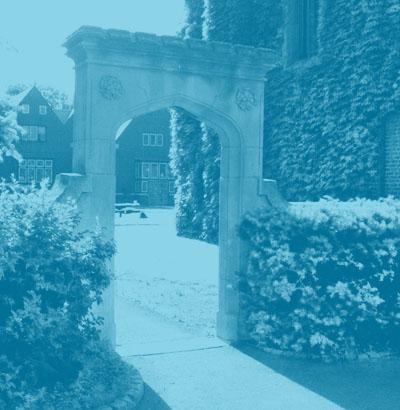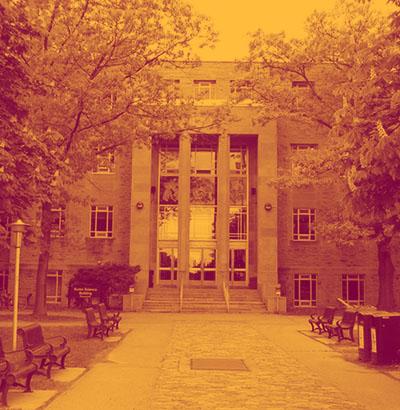Expandable List
Concentration: Earth And Environmental Science
After iSci, I completed a dual degree program at Western University combining a J.D. in Law and an M.Sc. in Geology. I also completed the Global Sustainability Certificate Program. I focused my education on mining and natural resource law. During a semester abroad in Dunedin, New Zealand, I conducted legal research on freshwater pollution, a study that was recognized by the New Zealand Environmental Defense Society.
Since graduating from Western, I have started my career in corporate/commercial law in Calgary, the hub for Canada’s energy markets. I am now an associate at Stikeman Elliott LLP, a leading international full service law firm. I have found my geological and environmental expertise to be of great benefit to corporate clients, particularly those operating in the natural resource industries. I enjoy channeling my inner geologist by hiking in the beautiful mountains of Alberta in my spare time.
 Concentration: Biochemistry
Concentration: Biochemistry
Current Position:
I started my Masters at the Stem Cell and Cancer Research Institute (SCCR-I) at McMaster the September after graduating from iSci. I am now doing my Ph.D. at the SCCR-I. About 18 months into my Masters, I transferred to my Ph.D. so as to continue my project which focuses on using human stem cells to create a model of heart disease.
At both levels of my graduate work (Masters and Ph.D.), I received funding from the Canadian Institutes of Health Research.
How ISci Helped Me:
The experiences we had in iSci in doing literature reviews and critically analyzing papers really helped me in my graduate work. I have also really benefited from the practice we had in presenting our work to our peers, including the creating the presentations and fielding questions from the audience.
What I Hope To Be Doing In 5 Years:
In 5 years I hope to be done school and working in industry where I can hopefully use my research experience to help translate primary research into clinical practice.
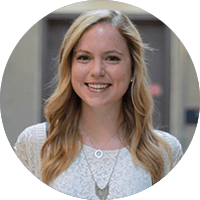 Concentration: Physics
Concentration: Physics
Current Position:
I am currently in the M.D./Ph.D. in Chemical Engineering (Biomedical Specialization) program at Queen’s University, working on a project involving chip-based diagnostics. I was awarded an NSERC Vanier Scholarship to support this work.
How iSci Helped Me:
iSci helped me hugely in learning how to write scientific documents: papers, proposals, etc. It also provided me with a broad scientific background from which I felt competent to tackle a variety of different subjects including chemical engineering and medicine. iSci connected me with faculty members early on – it allowed me to gain experience interacting in a professional way with academics, and gave me great personal resources to draw upon (e.g., when applying to scholarships). iSci introduced me to potential mentors and provided career inspiration (e.g., the guest lecture from Sheila Singh, M.D./Ph.D. was a major motivator for my career).
What I Hope To Be Doing In 5 Years:
Medical residency
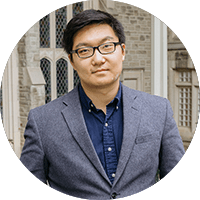 Concentration: Biochemistry And Biomedical Sciences
Concentration: Biochemistry And Biomedical Sciences
Current Position: M.D./Ph.D. At Western University
For the Ph.D. portion of my degree, I am studying macrophage cell biology
I received a CIHR Frederick Banting and Charles Best Canada Graduate Scholarship and a CIHR M.D./Ph.D. Studentship. I am also the Coordinator for Western’s Let’s Talk Science program and I am a Thames Valley Science and Engineering Fair Board Member
How ISci Helped Me:
iSci provided a solid foundation for professional and graduate school through emphasizing soft, transferable skills such as conducting a literature review and creating a research presentation. The program provided me a solid set of skills that have made the transition to graduate school much smoother.
What I Hope To Be Doing In 5 Years:
Residency in either pathology or surgery. I hope to be continuing to do research during that time.
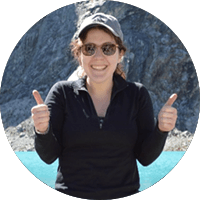 Concentration: Earth Science, With A Minor In GIS
Concentration: Earth Science, With A Minor In GIS
Current Position:
After iSci, I took some time off to work and visit family. Following one year off from school, I decided to do a Master’s in Earth Science at the University of Waterloo. I am in the second year of my Master’s in Earth Science at the University of Waterloo. I am studying natural hazards, and my thesis looks at the effect of climate change on landslide hazard in the mountain glacier environment. As part of my degree, I am currently working in Norway with the University of Oslo. I have been fortunate enough to receive several major scholarships since my time at McMaster.
In the first year of my graduate degree, I received an Ontario Graduate Scholarship. In my second year, I received an NSERC Canadian Graduate Scholarship. More recently I was granted the NSERC Michael Smith Foreign Study Supplement, which has allowed me to study with experts in my field for three months at the University of Oslo in Norway. In addition to Norway, I have been lucky enough to travel to Austria and Peru for my graduate degree.
How ISci Helped Me:
It’s amazing how well iSci prepared me for my graduate degree. Thanks to four years of hard work, amazing teachers and classmates, and a great curriculum, I have excelled in my graduate work so far. I can honestly say that the time management skills, research skills and independent learning habits developed in iSci have been invaluable. I would not have had the opportunities I have had without the skills I gained during my undergraduate degree.
What I Hope To Be Doing In 5 Years:
I think that most iSci students have a genuine passion for learning, myself included. Therefore, in five years I would like to be working in a field that allows me to implement the skills and knowledge I have acquired throughout my education, while affording me the opportunity to continue growing and learning. I am passionate about community wellbeing and safety, so a government or consulting job with an emphasis on environmental standards would be ideal for me!
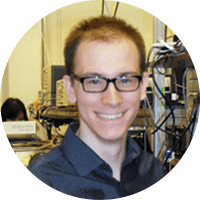 Concentration: Physics
Concentration: Physics
Current Position:
After iSci, I began graduate studies at the Institut National de la Recherche Scientifique (INRS) in Montreal, under the supervision of Prof. Roberto Morandotti. Following a year of Masters-level studies in the Ultrafast Optical Processing Group, I pursued an accelerated transfer to my Ph.D. My Ph.D. work (at INRS-EMT, Montreal) involves applied and fundamental research in the fields of nonlinear, integrated and quantum photonics with applications in e.g,. quantum information processing.
I received a Vanier Canada Graduate Scholarship and NSERC CGS-M to support my graduate work. I also have publications in multidisciplinary journals such as Science, Nature Photonics and Nature Communications.
How ISci Helped Me:
iSci’s focus on multi-disciplinary scientific literacy and effective communication has been instrumental in my development as a researcher. I am not only able to understand a wider range of literature, effectively communicate my work in papers and presentations, and write successful funding applications, but also use my interdisciplinary background to guide my choice of research direction.
What I Hope To Be Doing In 5 Years:
I hope to be conducting challenging research and development work in either an industrial or academic setting. I am particularly interested in new techniques and platforms for information processing.
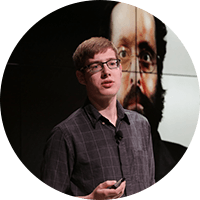 Concentration: Psychology, Neuroscience & Behaviour
Concentration: Psychology, Neuroscience & Behaviour
Current Position:
After iSci I started pursuing a Master’s degree in Industrial Organizational Psychology at the University of Waterloo. I am now finishing my Master’s degree and doing people analytics consulting work. Essentially, I use data to identify and address problems with human resources processes in mid to large organizations. My most notable accomplishments post iSci include presenting at Google’s prestigious re:Work conference and winning a SSHRC CGS-M fellowship.
How ISci Helped Me:
iSci helped give me a very practical lens for scientific research: in whatever I learn, I proactively seek out to apply it in a real world setting.
What I Hope To Be Doing In 5 Years:
In 5 years, I plan to be working as a people analyst or data scientist in a large technology company, using data to help improve employee wellness and performance.
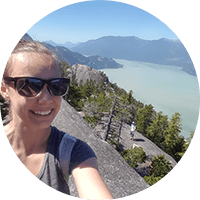 Concentration: Biophysics
Concentration: Biophysics
Current Position:
After iSci I moved to British Columbia and began my graduate studies at Simon Fraser University. I am finishing my M.Sc. in theoretical biophysics and non equilibrium physics at Simon Fraser University. I am involved with science outreach by being a coordinator for Let’s Talk Science at Simon Fraser University. I am also an active leader for Girl Guides of Canada and love learning new things every week with my unit.
I received the C.D. Nelson entrance scholarship from Simon Fraser University and currently have NSERC CGS-Master’s funding for my research.
How ISci Helped Me:
My current research is extremely interdisciplinary and iSci gave me an excellent background that allows me to collaborate with researchers in all disciplines. Developing my presentation and writing skills though the science literacy component of iSci has given me an advantage over my peers in graduate school. Finally, group work in iSci taught me not only how to work with a team, but I also learned about my own strengths and weaknesses as a researcher.
What I Hope To Be Doing In 5 Years:
I hope to be contributing to the development of innovative resources for STEM education. I am starting a degree in Educational Technology and Learning Design at Simon Fraser University in Fall 2017 and I want to work with K-12 teachers to bring more computer modelling into the classroom.
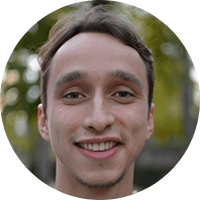 Concentration: Biochemistry For 1 Year And Then Switched To Biology For Latter 2 Years
Concentration: Biochemistry For 1 Year And Then Switched To Biology For Latter 2 Years
Current Position:
Dental school at the University of Toronto (DDS program); I am currently in my last year. I have already authored a paper published in a dental journal. While at McMaster I started a novel charity initiative and have carried it on at the University of Toronto in the dentistry program. I’ve expanded it every year.
How ISci Helped Me:
In iSci I learned how to learn; iSci helped me become a more independent learner; iSci also helped me develop confidence with my public speaking as well as feeling comfortable connecting with academic superiors (i.e., professors). Students in the iSci program develop a close bond with the profs in the program, and this allows you to feel more comfortable approaching and talking with profs in the future.
What I Hope To Be Doing In 5 Years:
Currently applying for Periodontics graduate programs; I’d also love to incorporate teaching and community outreach into my future career.
 Concentration: I Was Unconcentrated, But Minored In Women’s Studies.
Concentration: I Was Unconcentrated, But Minored In Women’s Studies.
Current Position:
The year after I graduated I was an au-pair in France to relax, travel and improve my French. I am now a full-time M.Ed. student in the student services and student development stream at OISE. Professionally, I am the Pathways Support and Dual-Credit co-ordinator at Centennial College. I have maintained an A+ average in graduate studies and am currently involved in a project to publish a book on student development in a Canadian higher education context.
How ISci Helped Me:
iSci equipped me with strong communication skills which I heavily rely upon as both a student and a professional. Being able to communicate ideas orally and in written form is an essential component of all my different roles. Having confidence in my abilities in these areas are crucial to my success. Additionally, the creative problem solving and teamwork that iSci fosters has been very helpful to my life at Centennial and OISE. Furthermore, I would recommend getting involved with the Synthesis Symposium, as this has been very helpful to discuss in interviews as employers are often looking for strong organizational and leadership skills.
What I Hope To Be Doing In 5 Years:
In five years I hope to have a managerial role at Centennial college in the outreach department, helping at-promise and disadvantaged students persist at post-secondary education.

